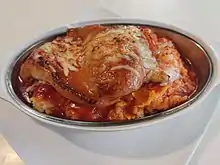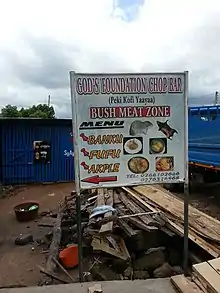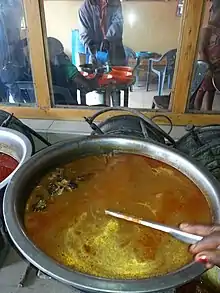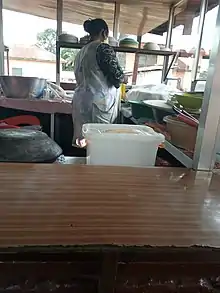Chop bar
A chop bar is a traditional eatery in Ghana[1][2] mostly located in the country's south.[3][4] In Ghanaian pidgin, to chop, far from cutting, means to eat. It may also mean, in reference to money, to spend or squander. In other words, a chop bar is a place where we �chop� [i.e. eat]. And so from this evolved what I think is an important cultural icon of this country, the same way as burger bars are American and fish and chips shops are British. Nigeria even has its popular �suya� meat joints, replete with local drinks.Meals are served in local earthenware bowls and foods are usually eaten at the premises.[5] Most of these bars are stocked with local alcoholic drinks with few foreign drinks available. It is a cultural icon of Ghana,[6] and is a favourite of the locals.[7][8][9]



Etymology
The term 'chop' is derived from 'eat' in Ghanaian pidjin or cut into pieces[6] in a local context.[7] Chop bars mostly sell indigenous Ghanaian foods like fufu, banku, konkonte, and omotuo (rice balls) with different kinds of soup.
References
- Ferris, R. S. B. (1998). Postharvest Technology and Commodity Marketing: Proceedings of a Postharvest Conference, 2[9] Nov to 1 Dec 1995, Accra, Ghana. IITA. ISBN 9789781311116.
- Yankah, Kwesi (1990). Woes of a Kwatriot: Reflections on the Ghanaian Situation. Woeli Publishing Services. ISBN 9789964904258.
- "Chop bar operators urged to register and collect VAT". www.ghanaweb.com. Retrieved 2019-06-10.
- "Let's Go Eating At A Tema Chop Bar". Modern Ghana. 2008-10-22. Retrieved 2019-06-10.
- Hugon, Philippe; Farrugia, Caroline (1989). The Informal Sector: Women and Development Planning in Africa. Division of Studies for Development, Unesco.
- Online, Peace FM. "It's Easy For A Foreigner To Be Confused By The Words 'CHOP BAR'". www.peacefmonline.com. Retrieved 2019-06-10.
- "The Wonderful Ghanaian CHOP BAR Experience". GhanaCelebrities.Com. 2014-09-25. Retrieved 2019-06-10.
- Frimpon, Kwame (June 2010). The Boy in the Oversized Smock: School Memories in Living Color. Xlibris Corporation. ISBN 9781450077590.
- King, L. K.; Awumbila, B.; Canacoo, E. A.; Ofosu-Amaah, S. (2000-07-21). "An assessment of the safety of street foods in the Ga district, of Ghana; implications for the spread of zoonoses". Acta Tropica. 76 (1): 39–43. doi:10.1016/S0001-706X(00)00087-5. ISSN 0001-706X. PMID 10913764.
